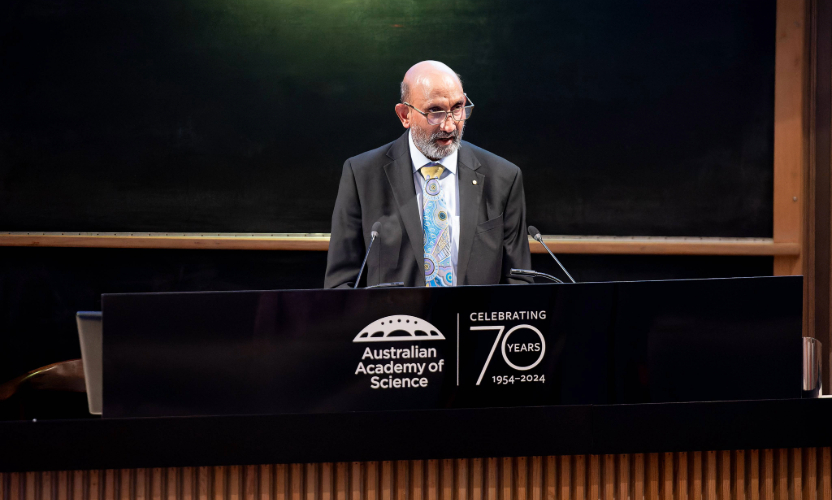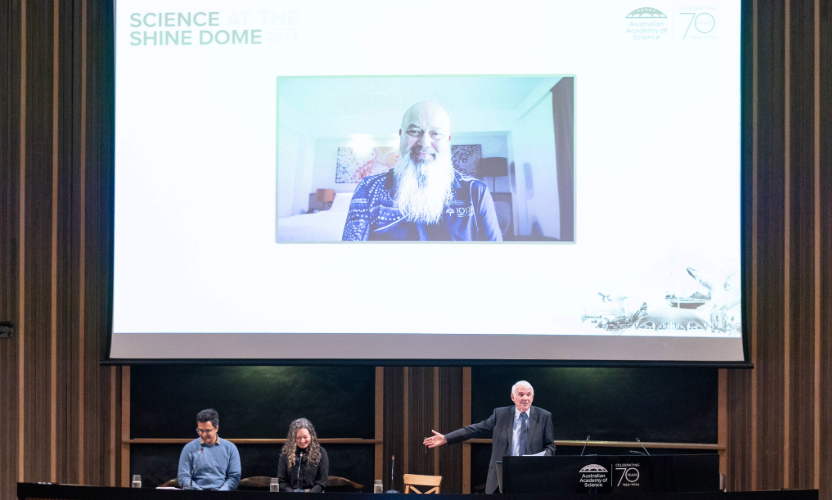Respect, include and celebrate: a vision for reconciliation in Australia’s science community
- 3 mins read


In a gathering of its Fellows, and early- and mid- career researchers from across the nation and the Asia-Pacific region, the Australian Academy of Science has launched its Innovate Reconciliation Action Plan (RAP) as part of its 70th anniversary celebrations at Science at the Shine Dome 2024.
The Academy’s new Innovate RAP outlines practical steps to respect and celebrate Traditional Knowledges of Australia’s First Nations Peoples to build a stronger, more innovative, and sustainable nation and world.
President of the Academy Professor Chennupati Jagadish said the Innovate RAP is a significant milestone for the Academy, coming after the successful completion of commitments in the Academy’s Reflect RAP.
“Securing our nation’s future economic and social prosperity will be driven by embracing skills, knowledges and experiences from a diverse range of people,” Professor Jagadish said.
“Our work will recognise Traditional Knowledges in Australia’s scientific and technological knowledge systems.
“I thank all those who developed this Reconciliation Action Plan, including the Reconciliation Action Plan Working Group, Academy Council, Fellows and staff.”
Academy Chief Executive, Anna-Maria Arabia said the Academy recognises the process of reconciliation is continuous and seeks to overcome challenges and learn from mistakes of the past.
“Through our efforts to progress reconciliation and adopt better practices, we aim to model and encourage diversity and inclusion throughout Australia’s science sector.”
Launch of the Innovate RAP
The Academy’s Innovate RAP was launched during the afternoon session of Science at the Shine Dome on 10 September, where Indigenous researchers from the RAP Working Group and the Academy’s EMCR Forum discussed reconciliation actions in the STEM sector.

Academy Fellow Professor John Patrick introduced panel members Michelle Hobbs, Dr Jordan Pitt and Professor Bradley Moggridge.
“Reconciliation is everyone’s business,” Professor Patrick said.
Bidjara descendant Ms Hobbs from Griffith University, joint recipient of the 2023 Aboriginal and Torres Strait Islander Scientist Award, spoke about connecting to Country while conducting research.
She said we can move forward by working with communities and co-designing research projects.
“When you give communities the opportunity to weigh-in to aims and outcomes [of research] you’re giving them direct involvement and agency in being involved and for there to be tangible benefits to the community as well,” Ms Hobbs said.
Birri Gubba man Dr Jordan Pitt from the University of Sydney said when it comes to Indigenous Knowleges, it is not about finding a needle in the haystack, but rather the whole haystack is important.
“What you might think is important in your scientific research might not be what community thinks is important, which is something to be aware of when trying to engage [with community].”
Kamilaroi water scientist Professor Bradley Moggridge from the University of Technology Sydney, who is a member of the Academy’s RAP working group, said there have been improvements in the Academy’s reconciliation actions since the launch of the Reflect RAP, including courage in the conversations and leading by example.
Professor Moggridge made several recommendations beyond those in the Innovate RAP, including increasing the number of Indigenous Fellows in the Academy, and enabling Indigenous scholars to lead projects through the Academy.
“I would also love to see an Indigenous Knowledges National Committee at the Academy,” Professor Moggridge concluded.





